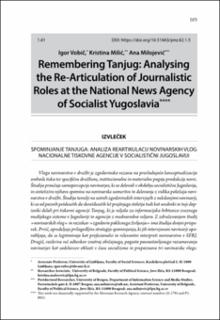Remembering Tanjug: Analysing re-articulation of journalistic roles at the national news agency of socialist Yugoslavia
Journal article
Published version

Åpne
Permanent lenke
https://hdl.handle.net/11250/3027872Utgivelsesdato
2022Metadata
Vis full innførselSamlinger
Originalversjon
The Contributions to Contemporary History. 2022, 62 (1), 103-122. https://doi.org/10.51663/pnz.62.1.5Sammendrag
Historically, the role of journalism in society is bound to the prevailing conceptualization of the freedom of the press, specific societal, institutional, and material conditions of news production. This study explores self-perceptions of journalists working in the period of socialist Yugoslavia and synthetizes their recollections of journalistic orientations and performances with respect to journalism’s place in society. The study is based on the oral history interviews with former journalists, who worked also as editors and foreign correspondents from late 1950s to 1990s at the news agency Tanjug, which was considered the information backbone of the federal media system in Yugoslavia and had considerable international relevance. By combining ‘journalistic roles’ studies as well as ‘occupational life history’ research this historical study makes twofold contribution. First, it identifies adaptive strategies of remembering used by the interviewed journalists to legitimize themselves as professionals and relevant interpreters of SFRY journalism. Second, it reveals more nuances within common, often simplified understandings of journalists as collaborators with power during socialism, and highlights roles of privileged disseminator, monitoring analyst, and educator as specific manifestations of collaborative function of journalism.
